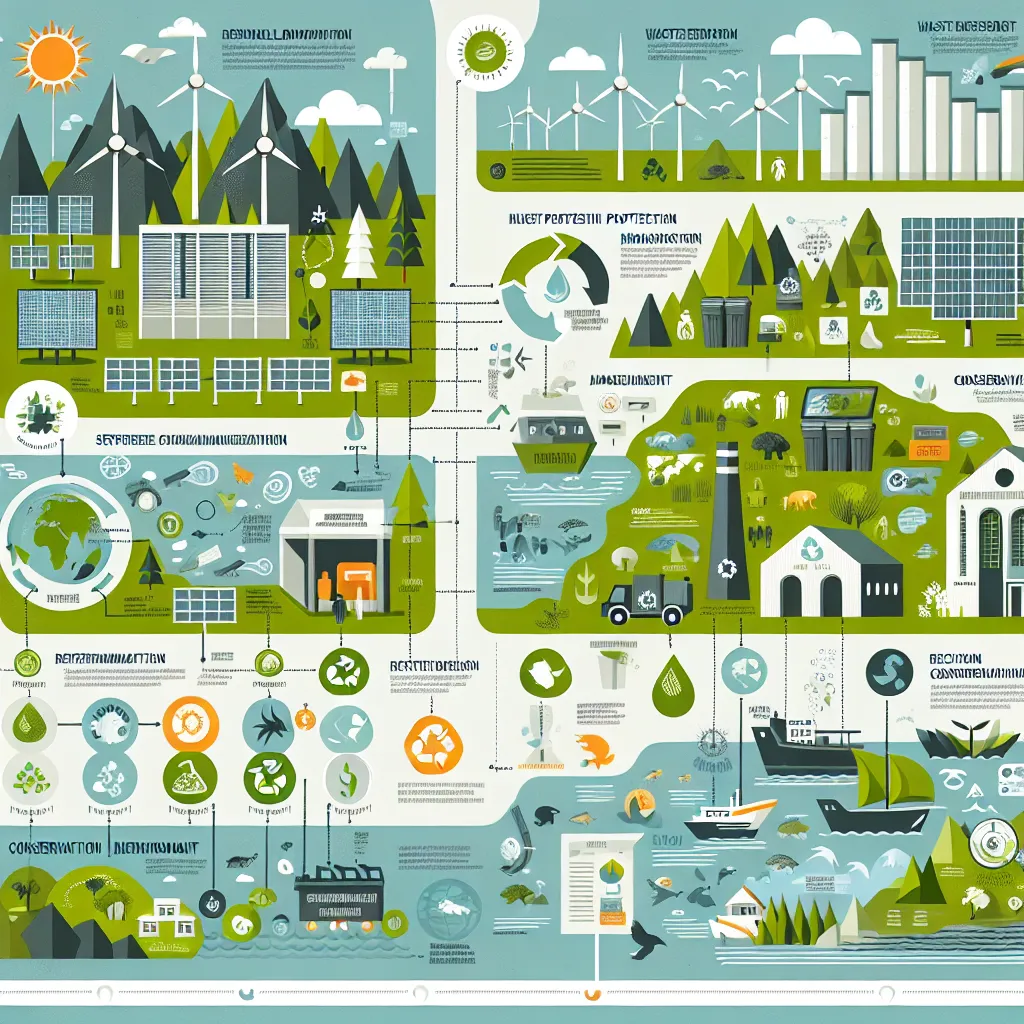The IELTS Reading section is a crucial component of the test, assessing your ability to comprehend complex texts and extract relevant information. Today, we’ll focus on a topic that has gained significant traction in recent years: “The role of government in protecting the environment.” This subject has appeared frequently in past IELTS exams and, given its ongoing relevance, is likely to feature in future tests as well.
Nội dung bài viết
Environmental protection has become a pressing global concern, making it a popular theme in IELTS Reading passages. By practicing with texts on this topic, you’ll not only improve your reading skills but also gain valuable knowledge about a critical issue facing our world today.
 Government's role in environmental protection
Government's role in environmental protection
Reading Passage: The Government’s Role in Environmental Stewardship
Text
In recent decades, the critical role of governments in safeguarding the environment has come to the forefront of global discussions. As the impacts of climate change, pollution, and resource depletion become increasingly apparent, nations worldwide are recognizing the urgent need for comprehensive environmental policies and regulations.
Governments possess unique capabilities to enact and enforce measures that can significantly impact environmental outcomes. Through legislation, they can set standards for emissions, waste management, and resource conservation that apply to both individuals and industries. For instance, many countries have implemented carbon pricing mechanisms, such as carbon taxes or cap-and-trade systems, to incentivize the reduction of greenhouse gas emissions. These policies create economic motivations for businesses to adopt cleaner technologies and practices, thereby contributing to overall environmental protection.
Moreover, governments play a crucial role in funding and promoting research and development in green technologies. By allocating resources to scientific studies and innovative projects, they can accelerate the transition to more sustainable energy sources and production methods. This support often extends to providing subsidies or tax incentives for renewable energy initiatives, electric vehicle adoption, and energy-efficient building practices, all of which contribute to reducing the collective environmental footprint.
The preservation of natural habitats and biodiversity is another area where government intervention is essential. Through the establishment of national parks, marine protected areas, and wildlife reserves, governments can safeguard ecosystems and endangered species from the pressures of human activity and development. These protected areas not only serve ecological purposes but also provide educational and recreational opportunities for citizens, fostering a greater appreciation for nature and environmental conservation.
International cooperation is a key aspect of governmental efforts to protect the environment. Environmental challenges often transcend national borders, requiring coordinated action on a global scale. Governments participate in international agreements and treaties, such as the Paris Agreement on climate change, to set collective goals and share responsibilities for addressing global environmental issues. These collaborations facilitate the exchange of knowledge, technology, and resources, enabling more effective and far-reaching environmental protection strategies.
Education and public awareness campaigns are powerful tools that governments employ to promote environmental consciousness among citizens. By incorporating environmental education into school curricula and supporting public information initiatives, governments can cultivate a more informed and engaged populace. This increased awareness often leads to changes in individual behaviors and consumer choices, which collectively can have a substantial impact on environmental outcomes.
However, the role of government in environmental protection is not without challenges. Balancing economic growth with environmental conservation often presents difficult trade-offs. Some argue that excessive regulations can stifle innovation and economic development. Additionally, enforcing environmental laws and regulations can be complex and resource-intensive, particularly in developing nations with limited capacity.
Despite these challenges, the pivotal role of governments in environmental stewardship remains clear. As the guardians of public interest, governments have the responsibility and the capability to implement far-reaching policies that can shape the future of our planet. By leveraging their unique position to enact regulations, fund research, preserve natural spaces, foster international cooperation, and educate the public, governments can lead the way in creating a more sustainable and environmentally conscious world.
Questions
1-5. Do the following statements agree with the information given in the Reading Passage?
Write
TRUE if the statement agrees with the information
FALSE if the statement contradicts the information
NOT GIVEN if there is no information on this
-
Governments have the ability to create and enforce environmental regulations that affect both individuals and businesses.
-
All countries have implemented carbon pricing mechanisms to reduce greenhouse gas emissions.
-
Government funding for green technology research always leads to immediate environmental improvements.
-
The establishment of protected areas by governments serves multiple purposes, including education and recreation.
-
International environmental agreements are legally binding for all participating countries.
6-10. Complete the sentences below.
Choose NO MORE THAN TWO WORDS from the passage for each answer.
-
Governments can provide __ or tax incentives to encourage the adoption of renewable energy and sustainable practices.
-
The creation of __ by governments helps to protect ecosystems and endangered species from human activity.
-
Environmental challenges often require __ on a global scale due to their cross-border nature.
-
Governments use education and __ campaigns to increase environmental awareness among citizens.
-
Balancing economic growth with environmental conservation can present difficult __ for governments.
11-14. Choose the correct letter, A, B, C, or D.
-
According to the passage, which of the following is NOT mentioned as a way governments protect the environment?
A) Implementing carbon pricing mechanisms
B) Funding research in green technologies
C) Establishing protected natural areas
D) Banning all forms of fossil fuel use -
The passage suggests that government-led environmental education:
A) Is only effective when started at a young age
B) Can lead to changes in individual behaviors
C) Is more important than implementing regulations
D) Has little impact on consumer choices -
What challenge does the passage identify in government environmental protection efforts?
A) Lack of public interest in environmental issues
B) Insufficient technological solutions
C) Difficulty in balancing economic and environmental concerns
D) Absence of international cooperation -
The overall tone of the passage regarding the government’s role in environmental protection is:
A) Highly critical
B) Neutral and objective
C) Cautiously optimistic
D) Overwhelmingly negative
Answers and Explanations
-
TRUE – The passage states that governments can “set standards for emissions, waste management, and resource conservation that apply to both individuals and industries.”
-
FALSE – The passage mentions that “many countries have implemented carbon pricing mechanisms,” not all countries.
-
NOT GIVEN – While the passage discusses government funding for green technology research, it doesn’t state whether this leads to immediate improvements.
-
TRUE – The passage mentions that protected areas “serve ecological purposes but also provide educational and recreational opportunities for citizens.”
-
NOT GIVEN – The passage doesn’t provide information about whether international agreements are legally binding.
-
subsidies
-
protected areas
-
coordinated action
-
public awareness
-
trade-offs
-
D – The passage does not mention banning all forms of fossil fuel use as a government strategy for environmental protection.
-
B – The passage states that increased awareness from government education efforts “often leads to changes in individual behaviors and consumer choices.”
-
C – The passage mentions that “Balancing economic growth with environmental conservation often presents difficult trade-offs.”
-
C – The passage acknowledges challenges but overall presents a positive view of government’s role, suggesting a cautiously optimistic tone.
Common Mistakes to Avoid
-
Overgeneralizing statements: Be cautious about words like “all,” “always,” or “never.” The passage often uses more moderate language like “many” or “often.”
-
Confusing what’s stated with what’s implied: Ensure the information is explicitly given in the text, not just inferred.
-
Misinterpreting tone: Pay attention to the overall balance of the passage, noting both positive aspects and challenges presented.
-
Overlooking specific details: In questions requiring exact words from the text, make sure to choose the precise terms used.
-
Failing to distinguish between main ideas and supporting details: Understand the hierarchy of information presented in the passage.
Key Vocabulary
- Stewardship (noun) /ˈstjuːədʃɪp/ – the responsible management or care of resources
- Comprehensive (adjective) /ˌkɒmprɪˈhensɪv/ – including or dealing with all or nearly all elements or aspects of something
- Incentivize (verb) /ɪnˈsentɪvaɪz/ – to encourage or motivate (someone) to do something
- Biodiversity (noun) /ˌbaɪəʊdaɪˈvɜːsəti/ – the variety of plant and animal life in a particular habitat
- Transcend (verb) /trænˈsend/ – to go beyond the limits of something
- Consciousness (noun) /ˈkɒnʃəsnəs/ – awareness of and responsiveness to one’s surroundings
Grammar Focus
Pay attention to the use of modal verbs in the passage, such as “can,” “could,” and “should.” These are often used to express ability, possibility, or necessity, which are crucial in discussing government actions and potential environmental policies. For example:
- “Governments can lead the way in creating a more sustainable world.”
- “These collaborations could enable more effective environmental protection strategies.”
Practice using these modal verbs in your own sentences about environmental protection to improve your writing skills.
Tips for IELTS Reading Success
- Time management: Allocate your time wisely across all sections of the reading test.
- Skimming and scanning: Quickly identify main ideas and locate specific information.
- Keyword recognition: Highlight key terms in both the questions and the passage to find relevant information quickly.
- Practice regularly: Familiarize yourself with various question types and passage structures.
- Vocabulary building: Expand your knowledge of academic and topic-specific words.
- Read actively: Engage with the text by making mental notes or brief annotations.
- Don’t panic if you encounter unfamiliar words: Try to understand the context and overall meaning.
By following these tips and regularly practicing with passages like this one on environmental protection, you’ll be well-prepared for the IELTS Reading test. Remember, understanding complex texts on current global issues not only helps with your exam but also enhances your general knowledge and critical thinking skills.
For more practice on environmental topics, check out our article on recent environmental initiatives. Additionally, to explore how technology is aiding environmental efforts, read about AI’s role in combating environmental degradation.


